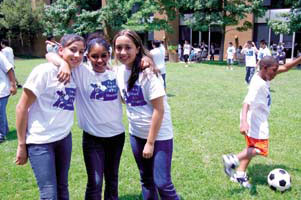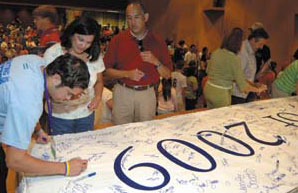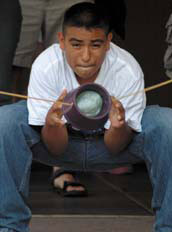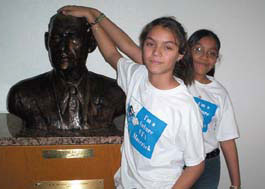| Solving the college mystery | Entrepreneurs extraordinaire | Ivy League Maverick |
| Home Forethought Campus Buzz Feature Stories Re:Search The Score Alum News Yesteryear | ||
 |
| Nursing demonstration with a lifelike mannequin. |
Yolanda Romo wants the best for her 13-year-old daughter, Gabriella. She especially wants Gabby to go to college. As a recent immigrant, though, Romo has no experience with the detailed paperwork required for college admission and financial aid applications.
Like many members of the nation’s fast-growing Hispanic population, Romo and her daughter look to UT Arlington for help with the college dream.
According to the U.S. Census Bureau, more than half of all Hispanics in Texas age 25 and older did not graduate from high school. Only 9 percent have college degrees. UT Arlington, in partnership with area school districts and other organizations, is working to improve those numbers and offer greater opportunities to students like Gabby.
"It is very important for her to get a college education," Romo said through a translator. "She has many opportunities here in America. I want her to be successful. She will be the first in our immediate family to go to college, so I am very proud of her."
 |
| "A Day at UTA." |
Earlier this year, Yolanda and Gabby, along with more than 100 other students and parents from the Dallas Independent School District, visited the University as part of the Mother/Daughter/Father/Son Program. Headed by alumna Rubi Salazar, the program is designed for sixth-grade students and focuses on dropout prevention.
"The campus was awesome," Gabby said. "I hear that computer majors are a good idea here. My mom loved it, too."
Both mother and daughter were impressed that the University offers Spanish versions of admissions, financial aid and scholarship publications. "That makes life so much easier for me," Yolanda said. "I want to know everything about the process."
Yolanda and Gabby are only two among hundreds of Hispanic students and parents hosted by UT Arlington in recent months. Michele Bobadilla, associate vice president for outreach services, is involved in a multitude of programs designed to make the Hispanic community aware of the University. She’s determined to expose Hispanics to higher education and demystify what college is all about.
 |
| Mother/Daughter/Father/Son Program. |
"With first-generation students and their parents, there’s a great fear of the unknown. College is foreign to them," she said. "Once we break down those barriers, the fear goes away."
Bobadilla, who speaks fluent Spanish, graduated from Dallas’ Woodrow Wilson High School. She knows what it’s like to be a first-generation college student and how it feels to struggle for an education. Her sister was the first member of the family to attend college, but after she and Michele graduated, their mother went back to school for her GED and eventually earned a master’s degree from Southern Methodist University.
Bobadilla’s primary focus is with Dallas County community colleges and the Dallas Independent School District. She works with community and faith-based organizations and ethnic chambers of commerce. UT Arlington is a vital part of DISD Higher Education Initiatives, which exposes students as early as prekindergarten to the benefits of college.
"Some of these kids begin to drop out of school in the sixth grade," she said. "That’s why it’s critical to reach them early."
 |
| Signing a pledge to graduate in four years. |
The efforts take many forms. Latinos Read is a citywide event focusing on literacy in the Latino community; Las Llaves del Exito (Keys to Success) helps high school juniors and seniors complete college applications, admissions essays and financial aid paperwork; Step Up to Success targets Dallas and Grand Prairie sixth-graders, helping them transition from elementary to middle school and prepare for higher education; and Parent Academies are held throughout the year at Dallas schools, offering assistance with educational issues.
Bobadilla also works with the League of United Latin American Citizens’ National Education Service Center in Dallas, which offers the Damas (Daughters and Mothers Attaining Success) Program, and she serves as vice chairwoman of the National LULAC Education Commission.
Other areas of campus are also reaching out.
In June, the College of Education hosted more than 80 seventh- and eighth-graders from four Fort Worth schools for "A Day at UTA." The event was part of Summerbridge, a six-week program that helps prepare economically disadvantaged middle-schoolers for academic success.
 |
| Physics demonstration. |
Wearing "I’m a future UTA Maverick" t-shirts, the students—70 percent of them Hispanic—attended a planetarium show, participated in a physics demonstration and saw the award-winning Society of Automotive Engineers racecar.
"For the majority, it was the very first time they had stepped foot on a college campus," said Susan Smith of Fort Worth Country Day School, which co-sponsored the program. "It created the very real notion that they can go to college and succeed."
In July, the School of Nursing hosted students from Fort Worth’s Trimble Tech and North Side high schools as part of the Aspiring STARS Camp funded by a three-year, $728,000 grant to recruit traditionally underrepresented minorities. Mary Jane Ashe, assistant director for undergraduate student services in the School of Nursing, said the program works intensely with students.
"It’s an opportunity for them to get an idea of what the medical field is all about," she said.
During one session, Ashe offered students hands-on experience working with stethoscopes and a wheezing mannequin that simulates a patient suffering from respiratory problems. Like the other UT Arlington outreach programs, this one has an impressive but attainable goal—making a college education both available and easily accessible to a historically underserved community.
 |
| Tour of the University Center. |
Though there is much yet to be accomplished, the University has received rave reviews on its efforts. Hispanic Outlook in Higher Education magazine named UT Arlington one of the 250 U.S. universities offering the best opportunities for Hispanic students. Institutions were selected because "they are learning what it takes to attract, enable, train, and motivate Hispanic students." The magazine also named the University to its Top 100 four-year colleges and universities awarding the most bachelor’s degrees to Hispanics.
Every day, faculty and staff work to meet the needs of a burgeoning Hispanic population. Bobadilla leads the way.
"Sometimes the job is very invigorating, and sometimes it’s very sad," she said. "Sometimes the information they need to make that critical decision isn’t there."
But the University keeps working to make the information available. And eager families like the Romos keep soaking it in.
Sophomore Maria Robles contributed to this article.
— Sherry W. Neaves
| Archives
| Alumni Association |
Giving to UTA | UTA
Home Copyright © 2005 UTA Magazine. All rights reserved. |
